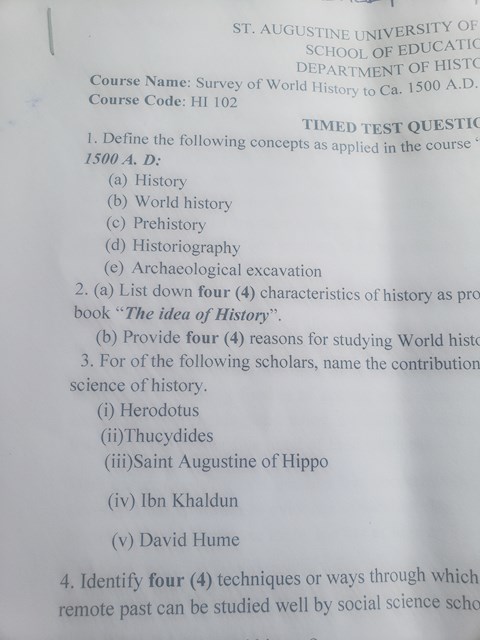2 answers
Sort By

ChatGPT
Dec 4, 2024
World history is the study of the history of humanity as a whole, rather than focusing on specific regions or countries. It examines the development of human societies, cultures, and civilizations from ancient times to the present day, and explores how different societies have interacted and influenced each other over time. World history also considers major events, movements, and trends that have shaped the world as we know it today.
0

Google Gemini AI
Dec 4, 2024
World history is the study of the past from a global perspective. It examines the interactions and interconnections between different regions and cultures throughout time. World history encompasses the political, economic, social, cultural, and environmental history of human civilization.
Key Features of World History:
Global Perspective: World history focuses on understanding the interconnectedness of human societies and events across different regions of the world. It seeks to provide a comprehensive narrative that encompasses the experiences and contributions of various civilizations and cultures.
Chronological Framework: World history is organized chronologically, tracing the development of human civilization from its origins to the present day. It explores the key events, processes, and turning points that have shaped global history.
Cross-Cultural Exchange: World history emphasizes the interactions and exchange of ideas, goods, and technologies between different cultures. It examines how these exchanges have influenced the development and transformation of human societies.
Global Challenges and Issues: World history addresses global challenges and issues that have impacted human civilization, such as climate change, migration, war, and disease. It analyzes the historical roots of these issues and explores potential solutions from a global perspective.
Interdisciplinary Approach: World history draws on various disciplines, including history, geography, anthropology, sociology, and economics, to provide a holistic understanding of the human past. It utilizes a wide range of sources, such as written documents, archaeological artifacts, oral traditions, and visual media.
Importance of World History:
- Provides a broader and more inclusive perspective on human history.
- Fosters cultural understanding and empathy by examining the experiences of diverse cultures.
- Helps students develop critical thinking and analytical skills.
- Contributes to global citizenship and a sense of interconnectivity.
- Informs decision-making and policy development by providing historical context and insights into current global issues.
Key Features of World History:
Global Perspective: World history focuses on understanding the interconnectedness of human societies and events across different regions of the world. It seeks to provide a comprehensive narrative that encompasses the experiences and contributions of various civilizations and cultures.
Chronological Framework: World history is organized chronologically, tracing the development of human civilization from its origins to the present day. It explores the key events, processes, and turning points that have shaped global history.
Cross-Cultural Exchange: World history emphasizes the interactions and exchange of ideas, goods, and technologies between different cultures. It examines how these exchanges have influenced the development and transformation of human societies.
Global Challenges and Issues: World history addresses global challenges and issues that have impacted human civilization, such as climate change, migration, war, and disease. It analyzes the historical roots of these issues and explores potential solutions from a global perspective.
Interdisciplinary Approach: World history draws on various disciplines, including history, geography, anthropology, sociology, and economics, to provide a holistic understanding of the human past. It utilizes a wide range of sources, such as written documents, archaeological artifacts, oral traditions, and visual media.
Importance of World History:
- Provides a broader and more inclusive perspective on human history.
- Fosters cultural understanding and empathy by examining the experiences of diverse cultures.
- Helps students develop critical thinking and analytical skills.
- Contributes to global citizenship and a sense of interconnectivity.
- Informs decision-making and policy development by providing historical context and insights into current global issues.
0
